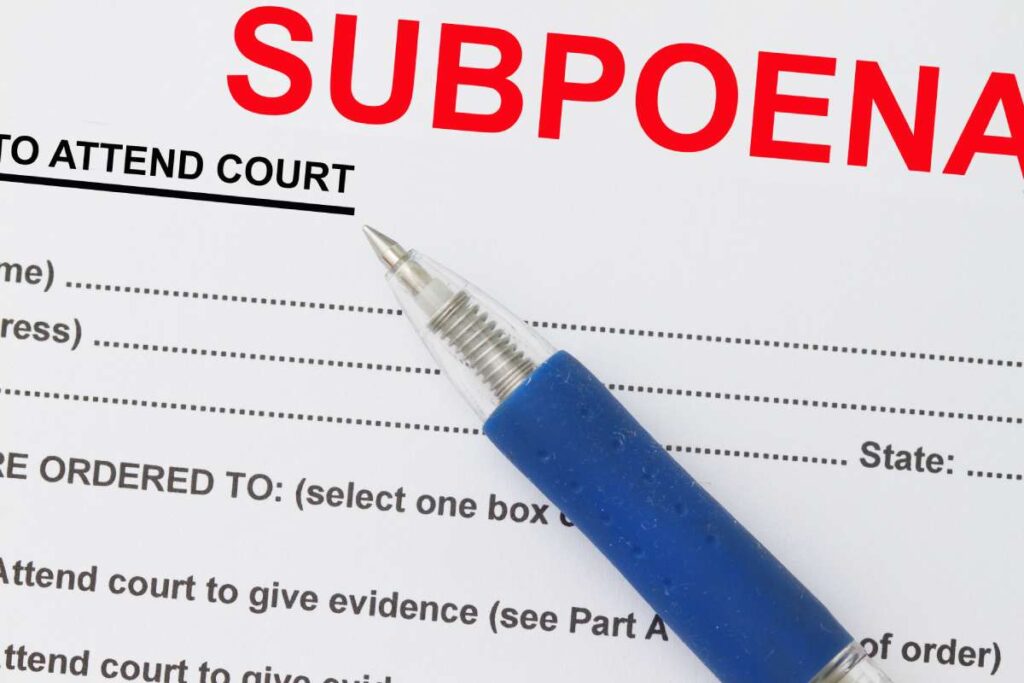
Perhaps you’ve recently received a certified mail, or worse—a process server has served you papers. Now you have a subpoena on your hands and you’re not sure what to do. What is a subpoena, and what should you do upon receiving one?
In essence, a subpoena is a court order that requires you to comply with a legal demand. If you fail to comply with a subpoena, you can face punitive action, including jail time.
While receiving a subpoena can be scary, your choices can ensure you avoid fines and other penalties. In this blog, we’ll explain the different types of court subpoenas and what to do if you receive one. Continue reading to learn what to do if you get served.
What Is a Subpoena?
A subpoena is a court order. This means that if you receive one, you must do something related to a legal matter or proceeding.
You might be subpoenaed if:
- You are a witness and have relevant information about a legal case
- You are party to a legal case
- You are a professional with relevant information related to a legal case, such as a medical doctor
There is no official or legal name for a person who is subpoenaed.
Types of Subpoenas
There are two different types of subpoenas:
- Subpoena ad testificandum: This type of subpoena requires you to testify in a court of law. A judge or lawyer will most likely ask you questions related to a legal case. You will provide the answers while under oath in court.
- Subpoena duces tecum: This type of subpoena requires you to submit evidence related to a legal case. These can include everything from paper documents to relevant objects. A subpoenaed document is a document that you must produce as evidence if you receive this type of subpoena.
Both types of subpoenas are legal orders, which means you legally must comply. If you fail to comply with a subpoena, you can expect steep fines. If you fail to pay the fines, you can even receive jail time. It is almost always wise to comply with any subpoena you are served.
What is a Summons?
Although you can be served either a subpoena or a summons, they are different documents. If you receive a summons, it means you are the defendant in a lawsuit. In other words, someone has decided to sue you. In contrast, a subpoena requires you to participate in an element of someone else’s lawsuit.
How Is a Subpoena Legally Served?

There are a few ways that a subpoena may be served. In most cases, you will receive a subpoena via personal service. This is the way you normally see people receive a summons on television and in movies.
A process server or police officer will serve you a subpoena in person. They may come to your home or your place of business. You will need to sign and confirm receipt.
Other subpoenas are served via certified mail. You need to sign a receipt to confirm you received the subpoena by mail.
In some rare cases, you may be served a subpoena by email. Occasionally, a subpoena will be delivered and left at your residence. In specific cases, a subpoena may be read aloud to you while you are in the courtroom. This only happens if you are party to a legal case.
What to Do if You Receive a Subpoena
Subpoenas are legal documents, which means they can be wordy. We advise you to read your subpoena carefully to find the most important information.
In most cases, you should look for the date and time they expect you to appear in court. If the court is requesting a subpoenaed document, those details will be included in the subpoena document.
If you need help understanding your subpoena, you can speak to an attorney or legal aid organization. Unfortunately, notary publics cannot help you with legal matters. It’s important to understand your rights before you respond to your subpoena. You can often ask questions when you respond to the attorney who issued the subpoena.
From there, the only thing to do is prepare. You may need to gather subpoenaed documents or other evidence. If you were subpoenaed to court, confirm the location and plan to appear on time. Be prepared to answer questions that are relevant to the legal case.
Do you need help posting bail following failure to respond to a subpoena? Call the experts at Bail Hotline. We’ll do our best to reunite you with your friends and family so you can embrace your second chance.